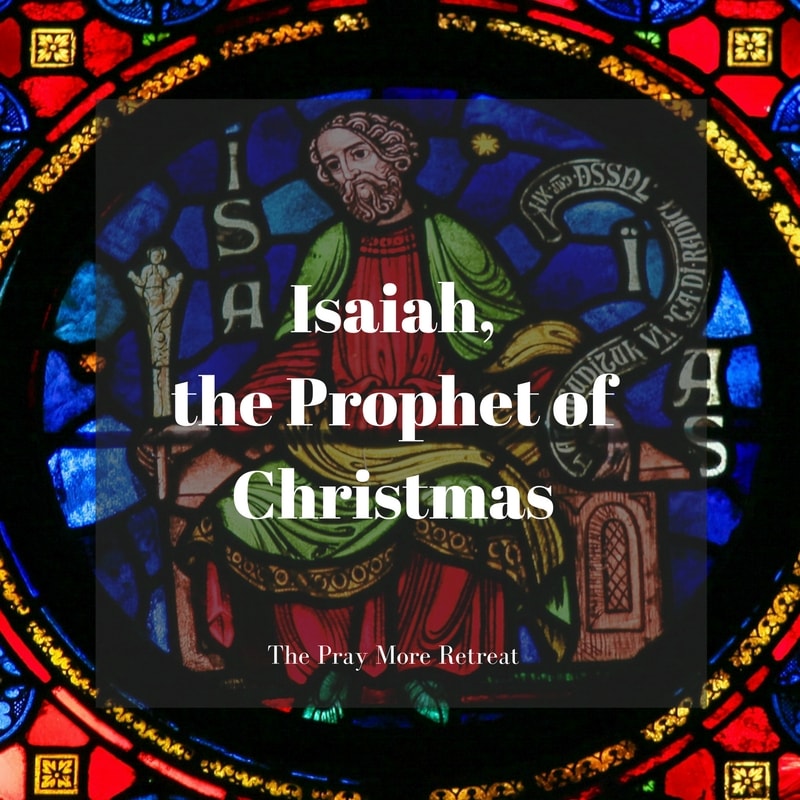Summary
Stephen talks about Isaiah’s prophecies and its possible underlying meanings. He discusses Isaiah’s life in a historical view, and shares with us his insights on Isaiah’s prophecy for the coming of Jesus Christ.
Thank you for watching and participating in this retreat!
Not Registered, yet? Don’t miss the rest of the talks! Register for the Pray More Retreat!
Downloads
Audio MP3
Click here to download audio file.
Printable Study Guide PDF
Click here to download the printable study guide.
Printable Transcript PDF
Click here to download the transcript of the video presentation.
Reflective Study Guide Questions
“Behold a virgin shall conceive, and bear a son, and his name shall be called Emmanuel. For a child is born to us, and a son is given to us, and the government is upon his shoulder: and his name shall be called Wonderful Counsellor, God the Mighty, the Father of the world to come, the Prince of Peace.”
Isaiah
- Isaiah declares that something wholly new will spring forth with Jesus’ coming at Christmas. This happened thousands of years ago and it also happens at each Christmas. Something wholly new can spring forth in our hearts and in our lives as we celebrate Jesus Christ’s entrance into the world. How will you live differently each day after Christmas with this realization? Will you look at the world differently? Will you carry your crosses differently?
- When Jesus Christ comes, Isaiah says that the desert and parched land will be glad, because He will pour water upon the thirsty ground. We have been waiting for Jesus and thirsting for Him. What is it that you have been waiting for from the Lord? In what ways do you feel parched and in need of His pouring out of water?
- Jesus tells us that He came so that we may have life, and have it abundantly. Hold that prayer intention of yours — the one you brought up just a few seconds ago — with great hope for the Lord is coming to bring you life. Renew your hope that He comes specifically for you. What things can you do this week to remind yourself to have hope amidst the darkness?
- Jesus Christ is the life of the world and when He comes to us at Christmas, He lightens our world. It’s easy to celebrate Christmas during Advent because of the music, the presents at stores, the wrapping paper and desserts that are all out so early in the season. But it’s important to remember that Advent is a somber season — a peaceful one full of anticipation. How can you commemorate this in your home? How will you keep Advent Advent and celebrate Christmas on Christmas Day and afterwards? Is there a way that you can incorporate darkness into Advent — like not putting up lights on your Christmas tree, or not lighting any candles? And is there a way you can incorporate light into Christmas?
- Isaiah declares that there will be overwhelming joy at Christ’s coming. Do you know someone who is joyful? What does that look like? How can you become more joyful this Christmas?
Text: Isaiah, the Prophet of Christmas
Hello. My name is Stephen Beale. I’m a columnist at CatholicExchange.com, and I’m currently completing my Master’s degree in theology at Providence College. I’m pleased today to be sharing with you some of my reflections on Advent. Before we get to the formal beginning of our lecture, I’d like to say a brief prayer.
Our Father
In the name of the Father, of the Son, and the Holy Spirit. Amen. Our Father, who art in heaven, hallowed be thy name; thy kingdom come; thy will be done on earth as it is in heaven. Give us this day our daily bread, forgive us our trespasses, as we forgive those who have trespassed against us. And lead us not to temptation, but deliver us from evil. For Thine is the kingdom, the power, and the glory, forever. Amen.
The Prophet of Christmas
Okay. Today, we’ll be talking about Isaiah, who I call “The prophet of Christmas”, and this is because the words of this prophet are among some of the most beloved verses from scripture we associate with Christmas. “Behold, the virgin shall conceive and bear a Son, and His name shall be called Emanuel.” “For a child is born to us, and a Son is given to us; and the government is upon His shoulder, and His name shall be called Wonderful Counsellor, God The Mighty, The Father of the World to Come, The Prince of Peace.” Those are Isaiah’s words, and they have become as much a part and parcel of the Christmas story as the 3 Kings of Orient, and the Herold Angels Singing. When we put all of these prophecies together and look at them as a whole, it’s amazing how much Isaiah foresaw. St. Rome said, and I paraphrase here, “The mysteries of Christ in the church are described with such clarity, you’d think you are not reading a prophecy of the future, but rather a history of things that happened in the past.”
So, what I would like to do today is to go through all of these prophecies and pick out common themes. And as I hope you’ll see, this is a fitting way to prepare our hearts and minds for Advent, Christmas. And perhaps that in turn will flow into our prayer life. But first, I want to give you just a brief background on who Isaiah was. Now, I want to get one issue out of the way from the get go. For those of you who do a lot of personal study, you may hear some scholars, even some Catholic scholars, saying that there were really 2 authors of the book Isaiah. In fact, some people now even theorize that there were 3. Well, for our purposes here, we’re just going to go with the traditional view that there was one Isaiah. That’s how he’s quoted by Jesus and the New Testament authors. And given that there is one book, I think that is how we are meant to meditate and pray through it. So here, we’re just going to defer to the traditional view of one book, one author, one historical Isaiah.
Historical Isaiah
Alright, now we’ve gotten that out of the way. Let’s talk about the historical Isaiah. We don’t know too much about him, but there are a few key points I’d like to highlight here. First of all, in Hebrew his name means “God is salvation.” He lived in the 8th century before Christ. His prophecies span the reigns of the 4 kings of Judah. He acted in the role of prophet for up to 90 years. He lived in a time of foreign invasion and local chaos. He saw the growth of the Assyrian Empire, which at that time was the greatest the world had seen. And he also saw the defeat of the Northern kingdom of Israel. So he lived really in a time of moral and political decline. Now, briefly, I would like to also give you a very basic sketch of the book of Isaiah itself. The book consists of 66 chapters that are usually divided into 2 main parts. Chapters 1-35 deal with prophecies about Judah and Israel, 4 nations, the end times, the relationship with Judah to Assyria, and the future of Edom and Israel. And this breakdown is adapted from the summary in the Catholic encyclopedia.
Okay. Now, before we get to the second part of the book, there’s also an intermission of sorts from Chapters 36-39, where you find more of a historical narrative. Then after that, we get a second set of prophecies which begins, and these concern the future restoration of Israel after huge Babylonian exile. Just a few other things I’d like to note. After the Psalms, Isaiah is the Old Testament book cited the most often in the New Testament. And, like the Psalms, most of Isaiah is poetry. In fact, I would venture to say this is some of the most beautiful poetry in the Old Testament. And in fact, here’s how one scholar has described it: “Scholars have long marveled at the literary beauty and at the depth and power of Isaiah’s poetry. Most of the book of Isaiah was written in parallelism, the primary form of Hebrew poetry, as they employed a wide variety of poetic devices in individual verses, building the verses into hymns of praise, national lament, into oracles, satire, and even wisdom poems. For example, the Song of the Vineyard in Isaiah 5:1-7 is a terse, evocative, poetic masterpiece of the devastating application.”
Of course, we could say much, much more about Isaiah and the book of Isaiah. But let’s turn to our specific topic: His prophecies on Christmas and some common themes we see in these prophetic texts. And since this is a retreat on prayer, I’d like to propose 2 things. First, let these themes infuse your prayer life during Advent and Christmas. And second, if you’re in the habit of praying through scripture, consider using some of these texts that I’ll be citing shortly during Advent, and especially in Christmas.
Themes
Alright. Now to the themes we see in Isaiah’s prophecies of Christmas. Along with images of flooding deserts, there are also those that indicate a newness and abundance of life. “The virgin will conceive, and the barren woman with no children will rejoice at suddenly finding herself to have many. God will make the wilderness rejoice and blossom, such that it will even become like a second Eden.” Do not these motifs of Abundant life call to mind the world of Jesus Himself in John 10:10? “I came that they might have life, and have it abundantly.”
Motif of Light
There’s this motif of the light of the world. Isaiah’s filled with images of light breaking in on the darkness. At the midnight mass year, we read the beginning of Isaiah 9. “The people who walked in darkness have seen a great light. Upon those who live in a land of gloom a light has shone.” In Isaiah 42:9, this image is combined with the motif of prisoners who were being freed to suggest light that liberates. In order to convey the completely unexpected and miraculous newness of such light, Isaiah 42:16 then discusses this motif in terms of the healing of the blind. “I will lead the blind on a way they do not know. By paths they do not know I will guide them. I will turn darkness into light before them.” From the gospels, we know that the light that dispels the darkness of evil and leads us to God is Jesus. He’s the light that frees us from our sins and heals our spiritual blindness. Indeed, even Christ describes Himself in John 8:12 as the light of the world.
A Sense of Joy
And finally, there’s the sense of overwhelming joy that permeates the prophecies of Isaiah. Isaiah 52:8 declares: “Your sentinels raise a cry. Together they shout for joy. For they shall see directly before their eyes the Lord’s return to Zion.” According to Isaiah 25:9, “We shall rejoice and be joyful in his salvation.” This sense of overwhelming joy pervades Isaiah. “The very heavens and earth will break out in joyful song, even the wilderness, the barren women, and the ruins Jerusalem will rejoice.” Rejoice, I say again, rejoice always. For to us today a child is born in Bethlehem.
Well, I thank you for listening. Have a good day. May you have a blessed Advent and Christmas. Goodbye.
About Stephen Beale

Stephen Beale is a freelance writer and reporter based in Providence, Rhode Island. Raised as an evangelical Protestant, he is a convert to Catholicism. He writes a weekly column for CatholicExchange and also is a regular contributor to the National Catholic Register and Crisis magazine. He holds a B.A. in classics and history from Brown University. He also has completed the coursework towards an MA in theology at Providence College, where he has focused on the thought and spirituality of the early Church Fathers.

